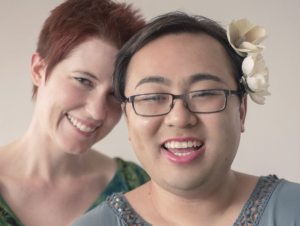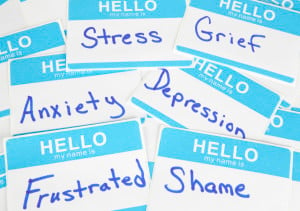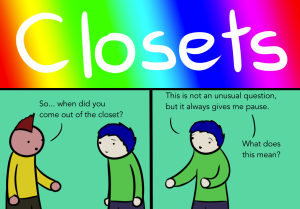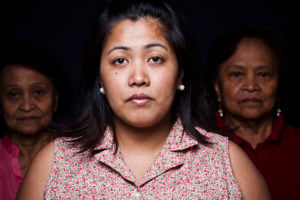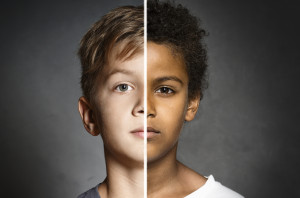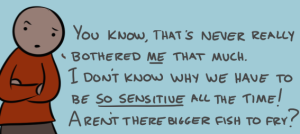
Source: iStock
Picture this: You’re scrolling through Facebook or Twitter when you come across an important discussion on something that affects you personally – like, say, sexual assault when you’ve been sexually violated before.
Since it’s something that’s very important to you, you decide to contribute to the discussion by offering your personal perspective, experience, and feelings around the subject.
Only to have it dismissed because you’re, supposedly, too emotional or too subjective.
Having your perspective dismissed because it isn’t “objective” enough is an incredibly frustrating – and unfortunately common – experience.
But a lot of us – both in social justice circles and out – tend to glorify objectivity in debates. Often, we think arguments and discussions are better when they’re unemotional, unbiased, and unattached from personal perspectives – exactly as we were taught.
By oppressive systems.
And so, glorifying objectivity in social justice debates can be really harmful for a number of different reasons.
In her book Black Feminist Thought, Patricia Hill Collins gives a brilliant explanation of how positivism – a school of thought that values objectivity and provable arguments – benefits white men the most. She also points out that black feminists and womanists have developed an alternative form of epistemology, or way of understanding knowledge, that she refers to as “black feminist thought.”
At risk of oversimplification, black feminist thought centers the lived experiences of marginalized people. It argues that subjectivity is valuable because people’s lived experiences are valuable – because people’s spoken truths are, in and of themselves, truths.
And it argues against the idea that objectivity – which involves an emotional detachment from knowledge – is important in all academic fields.
And this is an important perspective, particularly when exploring social justice.
So, with the work of Patricia Hill Collins and others in mind, let’s take a look at some of the reasons why glorifying objectivity in social justice debates can not only be counter-productive, but really oppressive.
1. Often, Those Who Seem ‘Objective’ Are Actually Just Privileged
I’m white, so I’ve never experienced racial oppression.
Racism is all around me, but I can feel a bit distant from the issue because I’ve never personally been hurt by it.
As such, it’s relatively easy for me to stay calm and unaffected in discussions on racism.
When I see racist remarks, I don’t feel personally attacked, so I don’t express anger or feel like crying. So I’m able to talk in a way that seems calm and cool. To many people, then, I might seem like I’m being fairly objective during these debates.
Here’s the thing though: My distance isn’t a sign of my being more rational. It doesn’t mean my arguments are more logical. And it doesn’t mean I’m objective.
Being able to remain unaffected during discussions about racism is a result of my white privilege.
I’m not at all an expert on racial oppression, but because people view objectivity as a requirement for a solid argument, my perspectives on racism might seem sound and logical.
People of color, on the other hand, experience racism regularly – and it can be incredibly difficult for them to seem calm during debates about something that affects them so often and so intimately.
In this context, my seemingly objective arguments might be given more weight than the arguments of people of color – who are directly affected by racism, and therefore actually understand what it’s like to experience racism.
And that’s ridiculous, right?
Let’s use another example.
Because I’m queer, I’m deeply hurt by heterosexist remarks. If someone erases queer people or says something heterosexist, I get flustered. I cry easily. I struggle to avoid getting emotional, because I become (rightfully!) angry about the bigotry directed towards me.
My queerness is an intimate part of me, so I view an attack on queerness as an attack on me.
While a straight person might seem more calm when it comes to queer issues, they’re certainly not more knowledgeable about being queer than I am.
When people face oppression, two things happen. Firstly, they understand that oppression like no privileged person would. Secondly, they often lose their ability to seem calm, rational, and unaffected by their oppression, because it hurts them so directly and so personally.
We are authorities on our own experiences and nobody else’s. Objectivity is often a sign of privilege and distance, not expertise.
2. Everyone Speaks From a Social Position and Has Biases
When it comes to conversations about social justice and oppression, objectivity is a myth.
None of us is unbiased. Not even the most level-headed person can be completely objective.
This is because we all speak from social positions.
Our identities affect our lived experiences because society attaches certain values to our identities. For example, your gender will affect the way society treats you because we live in a cissexist, sexist society.
My perspective on gender is biased because I’m oppressed because of my gender. My perspective on race is also biased because I’m privileged because of my race. When it comes to mental illness, I’m biased because I’m mentally ill – and when it comes to cissexism, I’m still biased because I benefit from cisgender privilege.
From this perspective, nobody can ever argue from an objective or neutral perspective on things like social justice – because society treats no identity with neutrality.
In other words, no matter who you are, your perspective will always be affected by the privilege or oppression you face.
It’s better for us to acknowledge our biases than to pretend they don’t exist at all.
When we acknowledge our biases – and when we check our privilege – we acknowledge that our understanding of a topic is affected by our societal position.
3. Striving Towards ‘Objectivity’ Is Used to Justify Tone-Policing
I often see privileged people dismiss marginalized people’s arguments in the name of “objectivity.”
They may say things like “I would like to have an objective discussion with you, but your tone is too angry and rude” or “How am I supposed to take your argument seriously when you’re so emotional?”
This happens to me a lot when I discuss queer issues. When I discuss corrective rape, biphobia, and the mistreatment of queer people in the workplace, it’s so much more than a debate to me.
The memory, or the threat, of those things happening to me is incredibly unnerving. For this reason, I’m emotionally attached to the debate – something which could cause me to seem angry or rude.
Glorifying objectivity leads to our belief that being emotional during debates is a bad thing.
But it isn’t a bad thing. As mentioned before, being emotional when you’re speaking about sensitive issues like social justice – especially if you’re personally affected by the issue at hand – is totally natural and normal.
But when people are emotional during discussions, they’re often tone-policed. This means that their views are seen as irrelevant because their tone comes off as angry, rude, or upset – even though they have every right to be hurt in those situations.
Objectivity and tone-policing are strongly interlinked because they stem from the same idea: that showing emotion invalidates your argument.
At the end of the day, tone-policing is a tool used against marginalized people who are upset about their oppression – and should be.
4. Sometimes Emotions Are Just as Important as Facts
Glorifying objectivity often leads us to dismiss people’s emotions.
We often see emotion to be the antithesis of cool, sound, calm reasoning and rational debate.
Here’s the thing: Oppression doesn’t simply affect people in political and economic ways. It also affects a person’s emotional and psychological health.
When women are constantly told they’re inferior to men, they feel less valuable.
When non-binary people are constantly told they don’t exist, they doubt themselves and their identities.
When mentally ill people are constantly told they’re lazy, they feel useless.
When queer people are constantly told they’re abnormal and deviant, they feel disgusting.
When trans people are constantly told they’re undesirable, they feel worthless.
The point is that oppression affects your feelings. Feelings affect how we make decisions, how we interact with others, and how we view ourselves.
Feelings are important because psychology is important.
Because of this, dismissing emotions in social justice debates erases a key aspect of oppression and hinders our understanding of one another’s experiences.
Rather than dismissing emotions or seeing them as a sign of a lack of objectivity, we need to engage with them. We need to understand that feelings, lived experiences, and psychology are absolutely important in activism and social justice.
After all, social justice is about human experiences. It’s absurd – violent, even – to discuss human experiences while leaving out such an important part of our humanity.
***
While working towards objectivity can be really useful, we shouldn’t place too much value on it – particularly when we’re talking about social justice, oppression and marginalization.
It’s important that we think about the way society glorifies objectivity and how this can be harmful to marginalized people. Thinking deeply about how we debate and think is crucial in interacting with others on the topic of social justice.
Thanks to Oliver February for inspiring this article.
[do_widget id=’text-101′]
Sian Ferguson is a Contributing Writer at Everyday Feminism and a queer, polyamorous, South African feminist who is currently studying towards a Bachelor of Arts majoring in English and Anthropology. Originally from Cape Town, she now studies at Rhodes University in Grahamstown, where she works as vice-chair of the Gender Action Project. She has been featured as a guest writer on websites such as Women24 and Foxy Box, while also writing for her personal blog. Follow her on Twitter @sianfergs. Read her articles here.
Search our 3000+ articles!
Read our articles about:
Our online racial justice training
Used by hundreds of universities, non-profits, and businesses.
Click to learn more





